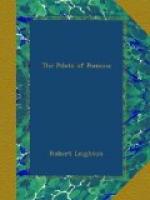“I’m real glad, Halcro, that ye werena drowned when the Curlew was wrecked.”
I was about to thank her for the part she had taken in my rescue when Captain Gordon interrupted. Said he:
“If that sinner, Carver Kinlay, had had his own way Halcro would have been drowned like the rest.”
Thora’s cheeks grew crimson.
“It is my father you speak of, sir,” she said very bravely; “and I hope what ye say isna true.”
“Your father! Carver Kinlay your father!” exclaimed the skipper incredulously. “Really, I beg your pardon, my girl.”
But already there was a tear in Thora’s eye, and she turned to join Hilda Paterson, who had gone on in advance. And the two girls walked onward to school.
“Well!” ejaculated the captain as he whipped up pony, “well, I should never have believed it!”
“Believed what, Mr. Gordon?” I asked.
“Why, that such a sweet young girl as that was the daughter of that villainous Carver Kinlay.”
“Ay! Thora’s a bonnie lassie,” I observed, with more feeling than I meant the words to convey; “and she’s as good as bonnie.”
“My lad, thank Heaven that your lucky stone and your splendid swimming saved you from that dreadful Sound of Hoy.”
“I would rather they had saved my father, Mr. Gordon.”
“I’ve no doubt you would, Halcro; but I was thinking of something else. I was thinking that when you grow older, and when little Thora—as you name her—is a woman—”
“Tuts! Mr. Gordon,” said I, guessing what he would be at. “The Kinlays and the Ericsons will never be friends.”
Thereafter Captain Gordon became very quiet and thoughtful, and when again he spoke it was about my own sister Jessie. He asked me many a question concerning her; and if I turned from the subject to point out some object in the scenery that I thought would interest him, he was sure to lead me back in some way to talk of Jessie.
We had now passed by the standing stones of Stenness, which my companion showed but little interest in, saying they were nothing compared with the Druid circle of Stonehenge, in England; and our way then lay along a straight uninteresting road past Finstown, and by the southern shores of the Bay of Firth, where the green holms of Damsay and Grimbister lay like floating gardens on the calm water. Soon the great red cathedral of St. Magnus loomed in sight above the antique houses of Kirkwall; and after our drive of fourteen miles we entered the old town and pulled up at the courthouse, where we met Abernethy and Miller and the rest who had been of the boating party.
I took the pony and gig to the Falcon Inn, and left them there until the trial should be over. I was alone the rest of the morning, for such an important trial as that of “Kinlay versus Paterson” must be conducted in private, and only those who appeared as witnesses or in other capacities connected with the case were permitted to be present.




